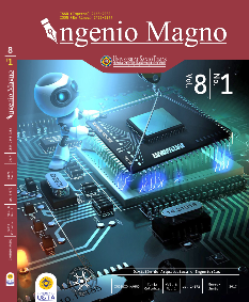Desarrollo de una aplicación móvil para recolección de datos de movilidad urbana
Main Article Content
Abstract
Downloads
Article Details
DECLARATION OF ORGINIALITY OF SUBMITTED ARTICLE
With this document, I/We certify that the article submitted for possible publication in the institutional journal INGENIO MAGNO of the Research Center Alberto Magno CIIAM of the University Santo Tomás, Tunja campus, is entirely of my(our) own writing, and is a product of my(our) direct intellectual contribution to knowledge.
All data and references to completed publications are duly identified with their respective bibliographical entries and in the citations thus highlighted. If any adjustment or correction is needed, I(we) will contact the journal authorities in advance.
Due to that stated above, I(we) declare that the entirety of the submitted material is in accordance with applicable laws regarding intellectual and industrial property, and therefore, I(we) hold myself(ourselves) responsible for any complaint related to it.
If the submitted article is published, I(we) declare that I(we) fully relinquish publishing rights of the article to the University Santo Tomás, Tunja campus. As remuneration for this relinquishment of rights, I(we) declare my(our) agreement to receive two (2) copies of the edition of the journal in which my(our) article appears.
References
Banker, K., Bakkum, P., Garrett, D. y Hawkins, T. (2016). MongoDB in Action. Recuperado de http://pepa.holla.cz/wp-content/uploads/2016/11/MongoDB-in-Action-2nd-Edition.pdf
Bayat, A. y Pomplun, M. (2013). A study on human activity recognition using accelerometer data from smartphones. Procedia Computer Science, 34, 450-457.
Chaniotis, I., Kyriakou, K. y Tselikas, N. (2014). Is Node.js a viable option for building modern web applications? A performance evaluation study. Computing, 97, 1023-1044.
Comisión de las Comunidades Europeas (2007). Libro verde, Hacia una nueva cultura de la movilidad urbana. Bruselas: Autor.
Conrad, F. (2016). Interview with Aigul Mavletova. Recuperado de https://www.coursera.org/learn/data-collection-methods/lecture/tntnF/4-4-interview-with-aigul-mavletova-national-research-university-higher-school-of
Díaz, V. (2001). Diseño y elaboración de cuestionarios para la investigación comercial. Madrid: ESIC.
Enríquez, J. y Casas, S. (2013). Usabilidad en aplicaciones móviles. Informe Científco Técnico UNPA, 5(2), 25-47.
Express (2016). Express: Fast, unopinionated, minimalist web framework for Node.js. Recueprado de https://expressjs.com/
Fishman, T. (2012). Digital-age transportation: The future of urban mobility. Nueva York: Deloitte University Press.
García-Castro, L. (2014). Hacia un sistema de movilidad urbana integral y sustentable en la zona metropolitana del valle de México (tesis doctoral). Ciudad de México: Universidad Iberoamericana.
Herce, M. (2009). Sobre la movilidad en la ciudad: propuestas para recuperar un derecho ciudadano. Barcelona: Reverté.
Holmes, S. (2016). Getting MEAN with Mongo, Express, Angular, and Node. Recuperado de https://www.manning.com/books/getting-mean-with-mongo-express-angular-and-node
IBM Corporation (2012). Desarrollo de aplicaciones móviles, hibridas y nativas. Recuperado de ftp://ftp.software.ibm.com/la/documents/gb/commons/27754_IBM_WP_Native_Web_or_hybrid_2846853.pdf
Mavletova, A. (2013). Data quality in PC and mobile web surveys. Social Science Computer Review, 31(6), 725-743.
Mavletova, A. y Couper, M. (2015). Grouping of Items in Mobile Web Questionnaires. Field Methods, 28(2), 170-193.
Ministerio de Transporte de Colombia (2012). Manual para estudios de origen y destino de transporte de pasajeros y mixto en áreas municipales distritales y metropolitana. Bogotá: Autor.
Miralles, C. (2002). Ciudad y Transporte: el binomio imperfecto. Madrid: Ariel.
Nielsen, J. (2012). Mobile Usability. Recuperado de https://www.safaribooksonline.com/library/view/mobile-usability/9780133122152/
Ortúzar, J. y Willumsen, L. (2008). Modelos de transporte (vol 1). Cantabri: Universidad de Cantabria.
Reyes, J. (2014). Smartphone-Based Human Activity Recognitiont (tesis de doctorado). Cataluña: Universitat Politècnica de Catalunya y University of Genoa.
Simek, C., Bricka, S., Wood, N. y Baker, R.(2014). Origin-destination data collection technology. En S. Rasouli y H. Timmermans (Eds.), Mobile technologies for activity-travel data collection and analysis. (pp. 1-16). Hershey: IGI Global.
Universidad de Alberta ( 2016). Client needs and software requirements. Recuperado de https://www.coursera.org/learn/client-needs-and-software-requirements/lecture/ZzPyb/lecture-2-types-of-requirements
Wang, S., Chen, C. y Ma, J. (2010). Accelerometer based transportation mode recognition on mobile phones. 2010 Asia-Pacifc Conference on Wearable Computing Systems, 2010, 44-46.

